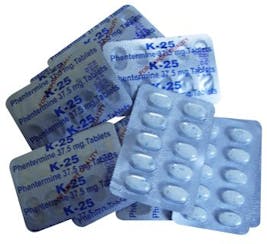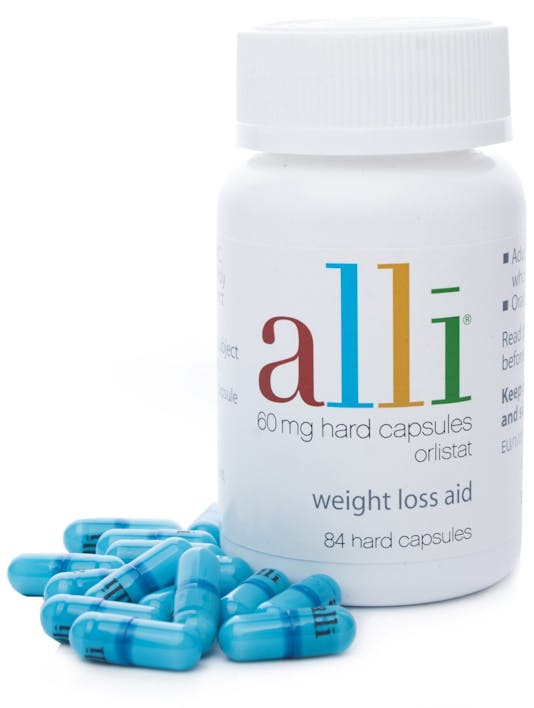It sounds like a dream. Keep living like you already do, take a pill a day, and effortlessly lose your excess weight. This is why weight loss pills is a billion dollar industry.
So does it work? Yes. But it’s not very effective.
There are many drugs that result in a modest weight loss (a few pounds on average) at the expense of significant side effects. In my opinion there’s only one drug that you may want to consider using.
Before we get to that one drug we’ll very briefly summarise the other options and why they are not great.
Prescription-Free Supplements

The internet is full of claims of magic supplements that can make you thin. Unfortunately the only thing they’ll make thin is your wallet. This is true even if they were once mentioned on Dr. Oz – you know that’s an entertainment show, right?
Any prescription-free supplements for sale that are not dangerous or illegal (like steroids) are likely to have a small or negligible effect on your weight.
This is true even for the vitamin supplements mentioned in advice #13 – the effect is definitely small, but in that case it’s also safe – maybe even healthy – and also dirt cheap, making it a potentially smart bonus (note that we sell no supplements whatsoever and make no money from this piece of advice).
There are also prescription free “carb blockers” out there, that are supposed to stop the body from absorbing carbs we eat. The effect tend to be relatively tiny though, even in studies funded by the companies selling the products. It’s definitely at least ten times more effective to not eat the carbs in the first place (it’s also free).
Older Appetite Suppressants
 In the US it’s still possible to get amphetamin-like appetite suppressants prescribed for short term use (weeks). As they are only for short term use they are no use for long term weight control. In the European Union these drugs are not allowed at all.
In the US it’s still possible to get amphetamin-like appetite suppressants prescribed for short term use (weeks). As they are only for short term use they are no use for long term weight control. In the European Union these drugs are not allowed at all.
These drugs have side effects like insomnia, heart palpitations and raised blood pressure. It’s also possible to become addicted to them and thus they require a special controlled substance prescription. Examples include:
- Adipex-P or Suprenza (Phentermine)
- Bondril (Phendiametrazine)
- Didrex (Benzphetamine)
The effect of these drugs is decidedly modest and short term, hardly outweighing their risks. I do not recommend them.
The “Oily Discharge” Pill

Let’s move on to another older drug, Xenical, lately for sale prescription-free as “Alli” and with a falling popularity.
This drug stops the body from digesting fat in the intestines. Instead it just passes through you and end up in the toilet… or in your pants.
Side effects include stomach cramping, gas, leaking oily stool and being unable to control bowel movements. And finally the “oily discharge” that often results when people think they are just passing some gas.
This pill is not compatible with wearing white pants and it’s not compatible with eating fat. Thus it’s not compatible with a low-carb diet. This does not mean you have to a wear white pants on a low-carb diet, you just need to eat fat (you understood that already, right?).
Just forget this drug. Most doctors already have.
The Stupid Pill
 Is there a worse option than Xenical/Alli? Why, yes. It’s called Qsymia.
Is there a worse option than Xenical/Alli? Why, yes. It’s called Qsymia.
Qsymia is available in the US, but it got rejected in Europe (where the side effects were sensibly judged worse than the benefits). I prefer to label this drug the “stupid pill”.
Qsymia combines a tiny amount of the old Phentermine (see Appetite Suppressants above) with a small dose of Topiramate, an anti-seizure drug.
The real problem? Common side effects of topiramate include somnolence, fatigue, depression, attention disturbance, memory impairment, cognitive disorder, impaired psychomotor skills (i.e. becoming clumsy), lethargy, balance disorder, sedation, gait disturbance (i.e. walking like you’re drunk).
Basically this drug slows down your brain, like alcohol or sedatives. Are you really going to do that to lose a few pounds, that you’ll regain once you stop taking the drug?
The “Meh” Pills
Two more weight control drugs were approved in the US in 2012 and are now available, Belviq andContrave.
Belvic has been rejected in Europe because of safety concerns. Contrave was recently approved (under the name Mysimba) but is not for sale yet as I write this (September 2015).
These two drugs work on different receptors in the brain to control appetite. The effect is modest – 6 to 8 pounds lost in a year, with partial regain after that. There are ongoing safety concerns with both drugs and a definite risk of side effects like (for Contrave) nausea, constipation, headache, risk of suicidal thoughts and seizures.
To me these modest benefits do not outweigh the risk of side effects.
The Reigning Champion
And then there is only one more approved weight loss drug left. Fortunately this one actually show a lot of promise and can speed up weight loss quite significantly.
This drug is an injected variant of a satiety hormone called GLP-1. It slows down the stomach from emptying and tells the brain that you don’t need to eat yet – a great idea for losing weight. As a bonus this drug works fine while on LCHF diet and it can make it even easier to combine it with intermittent fasting – for a rapid weight loss with no hunger.
This drug was initially used to control blood sugar in type 2 diabetes – under the brand name Victoza – where it has the nice side effect of significant weight loss.
Testing on people with obesity (without diabetes) show that at higher doses it’s quite effective as a pure weight loss treatment, with patients losing on average 12.3 pounds (5.6 kilos) more than a placebo group after one year.

This drug has recently been approved in both the US and in Europe for weight loss, under the nameSaxenda. There are many other similar GLP-1 drugs for treating diabetes type 2, but none of them are carefully tested or approved for treating obesity yet.
Saxenda already available in the US at the fantastic cost of $1,000 per month. It will probably be available in Europe towards the end of 2015.
In both the US and in Europe another option is Victoza, which is the exact same drug at half the dose and half the price. At this lower dose the resulting weight loss is about 75% of the weight loss on Saxenda. Victoza is only approved for treating type 2 diabetes.
The main side effect if Saxenda / Victoza is what happens if the satiety effect get too strong: nausea and vomiting. This is quite common when starting out and it’s necessary to start with a low dose and then slowly increase it as the body adapts to the medication.
The Bonus
If you have type 2 diabetes there is another diabetes drug that can result in noticeable weight loss: the “low-carb in a pill” drug Farxiga (called Forxiga in Europe).
The Bottom Line
There is no pill that easily makes people thin. These drugs are all pretty bad or at least not very effective.
The only exception in my mind is Saxenda – and this is a daily injection, not a pill.
The downside to Saxenda is the very high price – insurance may only cover part of it – and the nausea that people often experience on it.
It’s also clear from my own and other people’s experience treating patients with it that it does not work great for everyone. Some people experience only minimal weight loss. Other people get a lot more than the extra 12 pounds lost in a recent study – this is only an average.
Finally Saxenda only works as long as you use it. Once you stop the weight tends to return. So is losing about 12 pounds worth $1000 per month and the risk of nausea? Only you can decide.
Most people who want to lose weight have a more than 12 pounds to lose. That’s why even the best weight loss drug in the world can only be an optional complement to other treatment. That’s why this piece of advice is number 18 out of 18. It may be a helpful addition for some people, but the advice higher on the list is what can make the biggest difference, by far.
Resource: dietdoctor.com
Không có nhận xét nào:
Đăng nhận xét